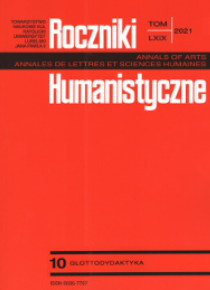SŁOWOTWÓRSTWO W NAUCZANIU JĘZYKA POLSKIEGO JAKO OBCEGO – OGRANICZENIA I MOŻLIWOŚCI
WORD FORMATION IN THE TEACHING OF POLISH AS A FOREIGN LANGUAGE: OPPORTUNITIES AND LIMITATIONS
Author(s): Marcin MaciołekSubject(s): Foreign languages learning, Theoretical Linguistics, Lexis, Semantics, Language acquisition, Western Slavic Languages
Published by: Towarzystwo Naukowe KUL & Katolicki Uniwersytet Lubelski Jana Pawła II
Keywords: word formation; categoriality; formal regularity; semantic regularity; teaching Polish as a foreign language;
Summary/Abstract: The article is devoted to the role and place of derivation in the teaching of Polish Language and Culture to foreigners. The author discusses the opportunities and limitations related to the inclusion of word formation issues in the teaching of Polish as a foreign language. Research has frequently indicated that the main factor hindering the decoding of meanings and word formations by foreigners is the ungrammaticality of the derivations (limited categoriality, and formal and semantic irregularity), which distinctively differentiates word formations from inflection, and locates it between grammar and vocabulary. It is generally believed that derivatives are acquired as lexical units. Following from Adam Heinz, the author claims that grammaticality is a gradable feature and proves that the difference between them is fluid. Raising students’ awareness of the particularly productive functions of affixes, and showing the rules of their use within word formation categories (which are more regular and frequent in everyday communication), contributes to the improvement of text reception and production skills, which in general facilitate language learning.
Journal: Roczniki Humanistyczne
- Issue Year: 69/2021
- Issue No: 10
- Page Range: 57-72
- Page Count: 16
- Language: Polish

